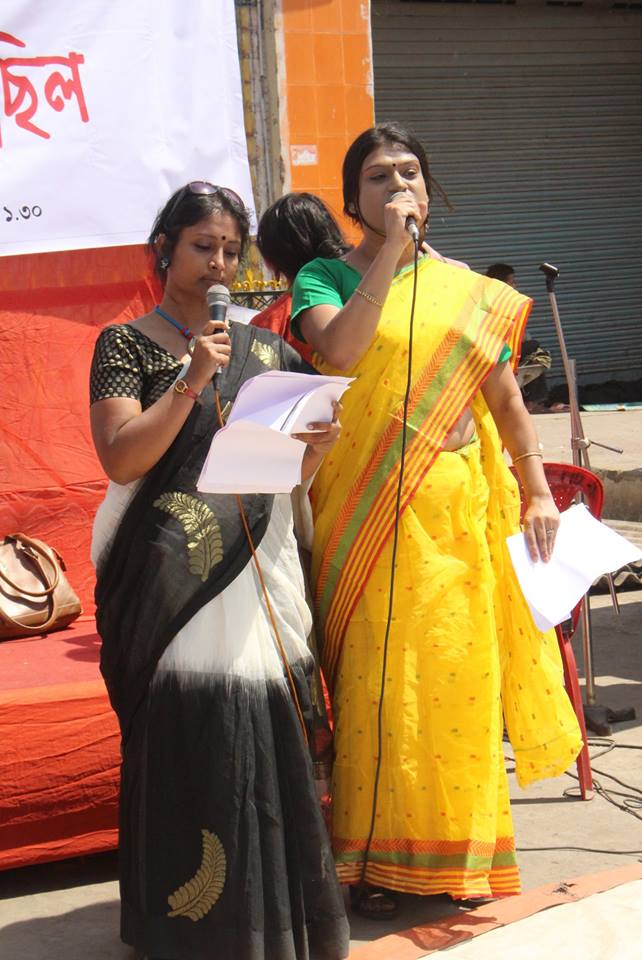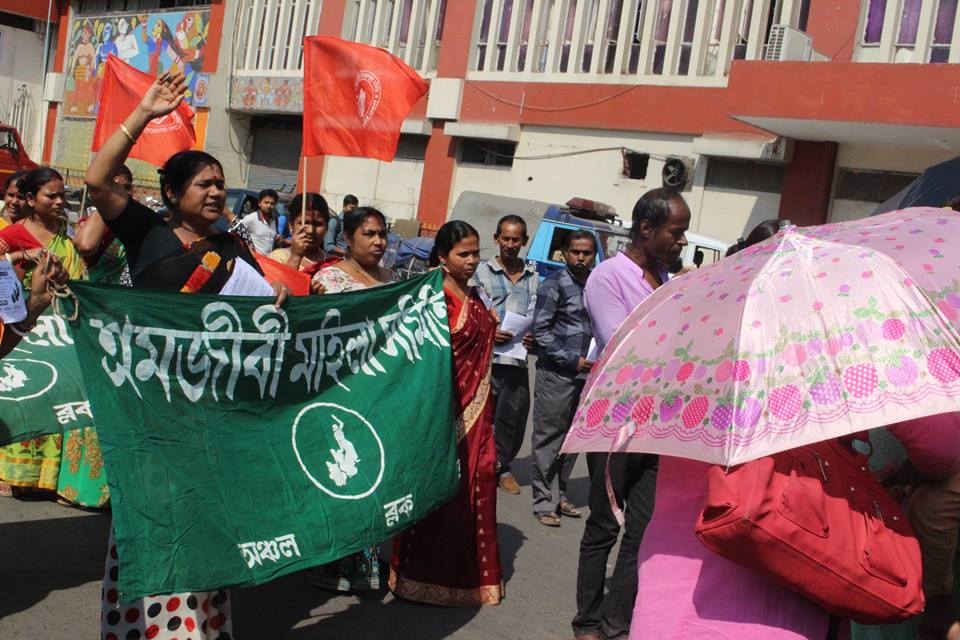
Hawkers in rally
The International Women’s Strike of 2017 [1], and the renewal of its appeal in late 2017 aimed at 8th March 2018, inspired militant activists in India as elsewhere. Facing an extremely grim reality, many organisations and activists had been feeling for several years that the time had long come to shed the ritualistic, and top-down “celebrations” of International Women’s Day, and to return to the militant traditions of the International Working Women’s Day [2] before it had been hijacked by the United Nations and capitalist companies offering discounts on everything from gold ornaments to electronic goods [3].
The life of women’s organisations and gender rights organisations tend to be uneven. Of the autonomous organisations that had sprung up in the late 1970s and early 1980s, in Kolkata only two continue as non-funded , non-party, politically alert women’s groups – Nari Nirjatan Pratirodh Mancha, and Sachetana. From the 1980s, the promotion of “safety net” approach had meant the promotion of funded NGOs. Many women activists had taken to these with goodwill. But the donor driven agenda that often took over NGOs meant that autonomy as perceived in the 1970s was slowly fading. Aware of the problems, the network Maitree was set up in 1996, which was itself to be a non-NGO, non-funded network.
But two problems started creeping up. One was age. Younger women often felt a distance from the older women in the leadership of the progressive NGOs, or in Maitree, or even in the remaining non NGO autonomous women’s groups. The second was the reality that many of the NGOs, busy with specific target areas of work, often had to recruit women who had specific skills, or were willing to do certain kinds of work, but were not necessarily as committed to feminism as the founders had been. Indeed, the term feminism seemed to slip out of the discourse quite often, to be replaced by the more vague women’s rights.
New organisations however did come up. Some, also from an NGO origin, went at least partially in the direction of turning into trade unions or working class women’s organisations. Two of these were the Durbar Mahila Samanway Committee, which is an organization of sex workers as well as other workers, with a trade union arm, and the Sramajibee Mahila Samiti. And then, from 2015, there was an effort to overcome these divisions. A demonstration of some three thousand had taken place that year, under the banner Das Theke Das Hajar, Pathe Nambo Bar Bar (from Ten to Ten Thousand, We will Come out Repeatedly on the Streets) [4]. Initially triggered by activists who were members of Maitree, this network also drew in forces from two contingents – the Durbar Mahila Samanway Committee and the Sramajibee Mahila Samiti on one hand, and Sappho for Equality and other activists and organisations from the LGBTIQ currents. And it attracted a number of other individuals, including student-youth. Coordination of such diverse forces has been a difficult process, with people moving in and out of orbit as their interests diverged. At times “class” and “sexuality” have been perceived as mutually exclusive. But over the last three years, DTDH has been able to establish a presence, with all programmes being funded through collections from supporters, and the stress on public activities, though important hall programmes have also been held. Thus, in March 2017, DTDH organized a day long programme where women, mostly from the unorganized sector, spoke of their experiences. Out of this came an attempt at a charter of demands for working class women.
So from late 2017, some of these forces started discussing united struggles. In the period between the late 1970s and the end of the first decade of the present century, the relationship between forces of the kind discussed above and the women organized in the major left party dominated organisations (the Ganatantrik Mahila Samity, the Paschim Banga Mahila Samity and the Nikhil Banga Mahila Sangha) had been often uneasy. With the fall of the Left Front Government in West Bengal, while memories of the past have hardly been forgotten, there have been cases of collaboration over specific issues, for example over the rape and murder of a student in Kamduni, in which sustained campaigns led to some of the guilty being produced in court, charge-sheeted, tried, convicted and sentenced in the trial court.
DTDH had a meeting on 29th January, in which Anuradha Talwar, a leader of the Sramajibee Mahila Samity as well as a coordination they have built, called Karmajibee Mahila Samity, was also present. The DTDH meeting proposed calling all organisations of women and transgenders, and campaigning over three planks – neoliberalism and the violence on women workers, sexual violence, and communalism and its impact on women.
The third is a specific, but extremely important dimension of Indian reality. The imposition of ever harsher neoliberal economic regimes have resulted in massive fightbacks by the working class. One consequence has been the failure of the Congress, the traditional party of the big bourgeoisie. This was what propelled the bourgeoisie in recent years to turn to the Bharatiya Janata Party, the electoral wing of the fascist combine led by the Rashtriya Swayam Sevak Sangh. Gender politics has always been a central part of this force. Hindu women have to be “protected” from the lustful eyes of Muslim men. Muslims are all bad, and should be driven out or converted to Hinduism, but… suddenly, Muslim women are oppressed, by the triple talaq and by polygamy – and never mind that illegal Hindu polygamy far outnumbers Muslim polygamy in India, or that the law on triple talaq passed by the Modi government criminalises the husband and actually makes reconciliation less likely, as well as makes payment of maintenance unlikely ( who will pay if the husband is put in jail?). One of the major recent manifestations of this reactionary gender politics is the claim that Muslim men pretend to fall in love with Hindu women in order to get them to convert to Islam. This has even been given a name – love jihad.
As for the situation of working class women, it is simply terrible. Housework is not seen as work. Waged work among women has been declining. The destruction of social security means woman’s double burden has been increasing by leaps and bounds.

There remained contentious areas and differences. In the end, this was kept at a minimum through an agreement that people could have their own, different leaflets and analyses. Two leaflets were issued, one signed by 23 organisations, and the other by 6 organisations. One issue was sex worker rights. Some of the signatories to the 23 organisation leaflet were opposed to recognizing trade unions for sex workers, falling back on arguments like trafficking, etc. Realising that this could not be overcome immediately, DTDH agreed on a compromise wording. The 6 organisation leaflet demanded recognizing sex workers as workers. Other issues were less clear, though there was a feeling that raising questions of sexuality and the space they would have could create a divide.
On 9th February, a meeting of the Karmajibee Mahila Samity was attended by several leading activists of DTDH, like Soma Marik, Joyanti Sen, Abir Neogy and others. The possibility of a common programme were further discussed. Based on these two meetings, further meetings were called, quite a large number of organisations participating in a spirit of democratic collaboration.

Despite the differences, the 29 organisations, as well as a couple of non signatory organisations, came together on a common platform. It was a long, half day programme. Just outside the busy Sealdah Station, one of the principal stations for both long distance and local commuters to Kolkata, a stage was set up and speeches and cultural programmes alternated from 10-30 to 1-30. Among the speakers were Soma Marik, who explained the historic significance of 8th March, the IWS and the return to class struggle feminism, and the need to understand why the struggles of people of minority/marginal/oppressed sexuality had to be understood in class struggle terms as well. Veteran feminist scholar Nirmala Banerjee talked about women’s work, and the struggle for recognition of all forms of women’s work. Raina Roy and Ranjita Sinha spoke, explaining the hurdles faced by transgenders. Rama Debnath of Durbar Mahila Samanway Committee, who is also one of the convenors of Karmajibee Mahila Samity, spoke about their demands. Two powerful plays were performed, one staged by women of the Karmajibee Mahila Samity, in which they showed what women’s work actually means and how it is often devalued. The charter of demands in the leaflet they issued talked about wages for housework, one area of clear difference, but one that once more needs serious discussion, since the reason they are putting forward the demand is, they are grappling with the reality that women when they work at home, are also contributing to capitalist production and reproduction, and this needs to be worked into our understanding of the class struggle.

Speeches were also given by other activists, like Sarbani Bhattacharya of Nikhil Banga Mahila Sangha, and songs, recitation of poetry, interspersed with the speeches. Mitali Biswas of the All India Progressive Women’s Association, and Anurag Maitrayee, a transgender activist, jointly recited poetry.While there were two leaflets, leading activists, from both sides, distributed both leaflets, in a gesture seeking to convey the idea that the differences need to be overcome through comradely debates.
A demonstration marched from Sealdah Station across the Sealdh flyover, to the Bank of India Bow Bazar Street.
The entire list of signatories were:
1. The twenty-three organisations (in alphabetical order): All India Democratic Women’s Association, All India Progressive Women’s Association, Association for Transgenders and Hijras of Bengal, Battle Against Corruption, Bon Phota Samity, ChitkarKaro Maye, Das Theke Das Hajar, Jabardakhal Patrika, Manabadhikar Suraksha Manch (MASUM), Nari Nirjatan O Durbrittayan Birodhi Ganamanch, Netaji Subhas Mission, Nikhil Banga Mahila Sangha, Paschim Banga Griha Sramik Union, Paschim Banga Ganatantrik Mahila Samity, Paschimbanga Rajya Pratibandhi Sammilani, Plus Kolkata, Sachetana, Samabhabana, Sramajibee Mahila Mancha-AITUC West Bengal, TUCC West Bengal, Women Against Sexual Harassment, Women Against Sexual Violence and State Repression, West Bengal Forum for Gender and Sexuality Minority Rights.
2. The six organisations: Asangathito Kshetra Sangramisramik Mancha, Karmajibee Mahila Parishad, Binodini Sramik Union, Sramajibee Mahila Samiti, All India Women Hawkers Federation, Durbar Disha Mahila Grihasramik Samanway Committee.

Posters demanding recognition of labour and minimum wages
Some of the principal demands:
• Recognition of all vocations in hich all workers, including women and transgender workers work and trade union rights and the application of labour laws.
• Equal pay for equal work regardless of gender.
• Minimum wage of Rs. 18000 per month for all workers, or Rs. 700 on a daily basis for a 26 day month.
• Full recognition as workers for women who work as domestic “maids”.
• Crèches in all workplaces, proper toilets for women and transgenders.
• Implementation of the Right of Persons with Disabilities Act.
" Gender Justice in all religious personal laws.
• Oppose the concept of love jihad, stop interfering in women’s right to choose their partners in the name of a fraudulent concept like love jihad.
• Defend sex workers, stop turning them into criminals in law. [Some participants were in favour of union rights as demanded by Durbar, but others were not].
Kunal Chattopadhyay

 Europe Solidaire Sans Frontières
Europe Solidaire Sans Frontières


 Twitter
Twitter Facebook
Facebook